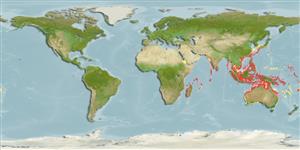>
Ovalentaria/misc (Various families in series Ovalentaria) >
Ambassidae (Asiatic glassfishes)
Etymology: Ambassis: Derived from Greek, anabasis = climbing up (Ref. 45335).
More on author: Bleeker.
Environment: milieu / climate zone / depth range / distribution range
экология
морской; пресноводный; солоноватоводный демерсальный; амфидромный (Ref. 51243). Tropical
Indo-Pacific: East Africa to the Philippines, Fiji and Carolines, north to Sagami Bay, Japan (Ref. 559).
Size / Вес / Возраст
Maturity: Lm ? range ? - ? cm
Max length : 14.0 cm TL самец/пол неопределен; (Ref. 637)
колючие лучи спинного плавника (общее число) : 8; членистые (мягкие) лучи спинного плавника (общее число) : 9 - 10; колючие лучи анального плавника: 3; членистые (мягкие) лучи анального плавника: 9 - 10. Body all silvery and translucent with a dusky midlateral band. Back margin evenly dark. Membrane between 2nd and 3rd dorsal spine blackish. Mouth strongly oblique. Margin almost straight from the origin of the 1st dorsal snout.
Common in brackish waters near river mouths where it occurs in schools; sometimes found in upper streams (Ref. 559). Mainly marine but enters rivers (Ref. 4967).
Life cycle and mating behavior
Maturities | размножение | Spawnings | Egg(s) | Fecundities | личинки
Masuda, H., K. Amaoka, C. Araga, T. Uyeno and T. Yoshino, 1984. The fishes of the Japanese Archipelago. Vol. 1. Tokai University Press, Tokyo, Japan. 437 p. (text). (Ref. 559)
Статус Красного Списка МСОП (Ref. 130435)
Угроза для людей
Harmless
Использование человеком
дополнительная информация
инструменты
Специальные отчеты
Скачать в формате XML
ресурсы в Интернет
Estimates based on models
Preferred temperature (Ref.
123201): 24.9 - 29, mean 28.1 °C (based on 882 cells).
Phylogenetic diversity index (Ref.
82804): PD
50 = 0.5000 [Uniqueness, from 0.5 = low to 2.0 = high].
Bayesian length-weight: a=0.01259 (0.00675 - 0.02347), b=2.99 (2.83 - 3.15), in cm total length, based on LWR estimates for this species & Genus-body shape (Ref.
93245).
Trophic level (Ref.
69278): 3.4 ±0.4 se; based on size and trophs of closest relatives
устойчивость к внешним воздействиям (Ref.
120179): высокий, минимальное время удвоения популяции до 15 месяцев (Assuming Fec > 10,000).
Fishing Vulnerability (Ref.
59153): Low vulnerability (10 of 100).
